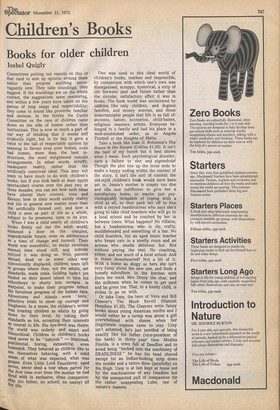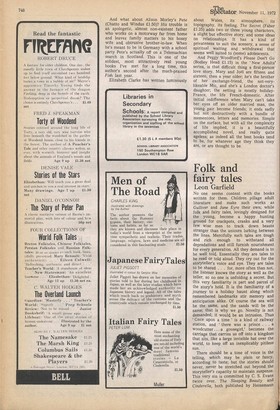Children's Books
Books for older children
Isabel Quigly
Committees putting out reports on this or that tend to sum up opinion around them rather than propose anything extravagantly new. They take soundings, then suggest. If the soundings are on the whole correct, the suggestions seem reassuring, and within a few years have taken on the Patina of long usage and respectability; they come to sound like proverbs, familiar and obvious. In the forties the Curtis Committee on the care of children came down on the side of homes rather than institutions. This is now so much a part of Our way of thinking that it seems self evidently right; but in its day it gave a twist to the tail of respectable opinion by seeming to favour even poor homes, even bad homes, more than the best institutions, the most enlightened outside arrangements. In other words, scruffy, inadequate reality, rather than the artificially contrived ideal. This may not seem to have much to do with children's books, but if you look back at their (quite spectacular) course over the past two or three decades, you can see how such ideas have altered their content, tone and flavour; how in their world untidy reality and life in general now matter more than the artificially formed unit, and how a Child is seen as part of life as a whole, subject to its pressures, open to its joys.
When I was a child nearly all children's books firmly cut out the adult world, slammed a door on the complex, unpredictable future, even on adolescence as a time of change and turmoil. Their World was monolithic, its social structure eternal; time stood still, and nobody noticed it was doing so. With parents abroad, dead or in some other way Conveniently displaced, children were left in groups where they, not the adults, set standards, made rules. Golding hadn't yet landed on their desert island to turn his schoolboys in shorts into savages in Warpaint, to make their progress reflect the ferocious progress of the human race. Adventures and islands were 'tests,' Primitive trials to show up courage and toughness. In a sense, the children's writer was treating children as adults by going down to their level, by taking their standards as his, accepting their interests aS central to life. His eye-level was theirs; the world was orderly and exact and hierarchical. Children in children's books 'used never to be " babyish " — irrational, Pestilential, boring, exhausting, even homesick. They behaved as children like to see themselves behaving, with a solid sense of what was expected, what was proper. Even Little Lord Fauntleroy, aged !even, never shed a tear when parted for .cihe first time ever from the mother he had ved with in exclusive, close companionship (no father, no school, no nanny) all his life. One was used to this ideal world of children's books, tearless and responsible, by comparison with which one's own was disorganised, scrappy, hysterical, a strip of life between past and future rather than the circular, satisfactory affair it was in books. The book world was uncluttered by oddities like only children, and dogless families, and money worries, and those unaccountable people that life is so full of: ancients, babies, eccentrics, child-haters, religious maniacs, artists. Everyone belonged, to a family and had his place in a well-established order, as in Angela Thirkell or the Knights of Malta.
Take a book like Joan G. Robinson's The House in the Square (Collins £1.25). It isn't the best of my bunch but it best shows what I mean. Such psychological disorder, such a failure to slot and pigeonhole! Though the plot ties up the loose ends to make a happy ending within the context of the story, it isn't the sort of context the old-style children's book would have been set in. Jessie's mother is simply too dim and idle and indifferent to give her a satisfactory home, or maybe just psychologically incapable of coping with a child at all, so they pack her off to live with a retired headmistress who says she's going to take child boarders who will go to a local school and be coached by her in between times. What happens? No villains, but a headmistress who is sly, crafty, muddleheaded and something of a liar. No child boarders, but an aged music teacher who keeps cats in a smelly room and an actress who smells delicious but flits without paying the rent. No coaching, either, and not much of a local school. And is Jessie downhearted? Not a bit of it. With a home as dingy as hers she isn't very fussy about the new one, and finds a homely subculture in the kitchen with Doris the maid, Mrs Drury the char, and the milkman when he comes to get paid and be given tea. That, to a lonely child, is riches to go on with.
Or take Ussy, the hero of Vera and 13ill Cleaver's The Mock Revolt (Hamish Hamilton £1.25). The Cleavers write funny books about young American misfits and I would rather be a turnip was about a girl overwhelmed with shame when her illegitimate nephew came to stay. Ussy isn't ashamed, he's just terrified of being exactly like his father (vice-president of the bank) in thirty year' time. Medina Florida, is a town full of Deadlies and to avoid being "sucked into the machinery of DEADLINESS" he , has his head shaved except for an Indian-looking strip down the middle and a tattoo done (painfully) on his thigh. Ussy is at last kept at home not by the machinations of any Deadlies but by the unexpected pull of compassion for the rather unappealing Luke, one of nature's leaners. And what about Alison Morley's Pete (Chatto and Windus £1.50)? His trouble is an apologetic, almost non-existent father who works on a motorway far from home and leaves family matters to his bossy wife and obtrusive brother-in-law. When he's meant to be in Germany with a school party Pete's actually off on a Telemachian search in Scotland. This is one of the solidest, most attractively real young books I've met for a long time, this author's second after the much-praised Fish last year.
Elizabeth Clarke has written luminously about Wales, its atmosphere, its topography, its feeling. The Secret (Faber £1.25) adds two or three young characters, a slight but effective story, and some ideas on relationships. It has a kind of privateness to suit the scenery, a sense of spiritual waiting and withdrawal that seems well suited to (some) adolescents.
And Peggy Woodford's Please Don't Go (Bodley Head E1.15) in the New Adults' series, is that difficult thing a first-person love story. Mary and Joel are fifteen and sixteen, then a year older; he's the brother of her exchange-friend, the not-verylikeable Mic, and she's a London doctor's daughter; the setting is mostly holidayFrance, the life French-domestic. After initial indifference when Mary can't take her eyes off an older married man, the young pair become friends; it ends sadly but not destructively with a bundle of mementoes, letters and memories. Simple on the surface, but with all the complexity of life implied, it is a beautifully accomplished novel, and really quite ageless; as indeed all the best books tend to be, for whatever age they think they are, or are thought to be.



















































 Previous page
Previous page